剑桥雅思口语话题归纳
剑桥版口语测试题及答案
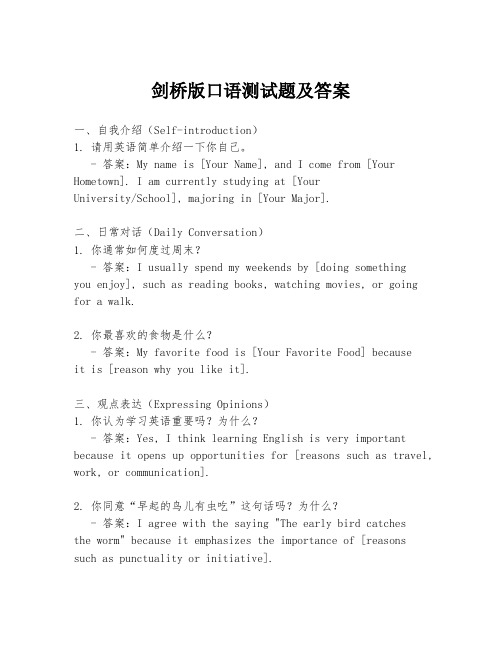
剑桥版口语测试题及答案一、自我介绍(Self-introduction)1. 请用英语简单介绍一下你自己。
- 答案:My name is [Your Name], and I come from [Your Hometown]. I am currently studying at [YourUniversity/School], majoring in [Your Major].二、日常对话(Daily Conversation)1. 你通常如何度过周末?- 答案:I usually spend my weekends by [doing somethingyou enjoy], such as reading books, watching movies, or going for a walk.2. 你最喜欢的食物是什么?- 答案:My favorite food is [Your Favorite Food] becauseit is [reason why you like it].三、观点表达(Expressing Opinions)1. 你认为学习英语重要吗?为什么?- 答案:Yes, I think learning English is very important because it opens up opportunities for [reasons such as travel, work, or communication].2. 你同意“早起的鸟儿有虫吃”这句话吗?为什么?- 答案:I agree with the saying "The early bird catchesthe worm" because it emphasizes the importance of [reasons such as punctuality or initiative].四、描述经历(Describing Experiences)1. 请描述一次你难忘的旅行。
剑桥雅思12Test7雅思口语Part3话题+范文
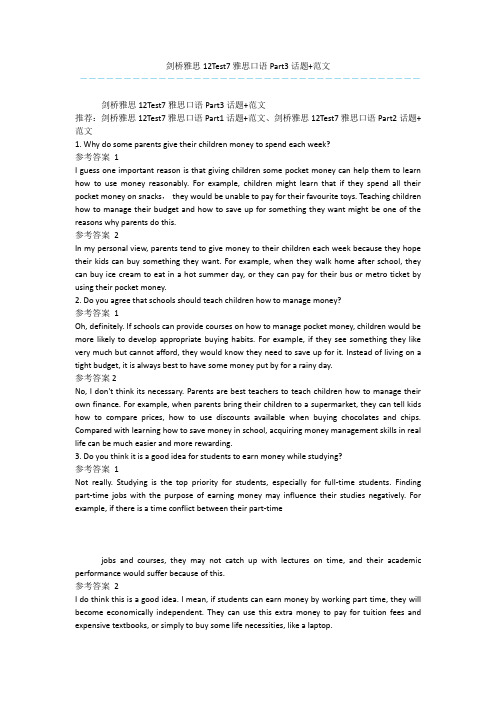
剑桥雅思12Test7雅思口语Part3话题+范文---------------------------------------剑桥雅思12Test7雅思口语Part3话题+范文推荐:剑桥雅思12Test7雅思口语Part1话题+范文、剑桥雅思12Test7雅思口语Part2话题+范文1. Why do some parents give their children money to spend each week?参考答案1I guess one important reason is that giving children some pocket money can help them to learn how to use money reasonably. For example, children might learn that if they spend all their pocket money on snacks,they would be unable to pay for their favourite toys. Teaching children how to manage their budget and how to save up for something they want might be one of the reasons why parents do this.参考答案2In my personal view, parents tend to give money to their children each week because they hope their kids can buy something they want. For example, when they walk home after school, they can buy ice cream to eat in a hot summer day, or they can pay for their bus or metro ticket by using their pocket money.2. Do you agree that schools should teach children how to manage money?参考答案1Oh, definitely. If schools can provide courses on how to manage pocket money, children would be more likely to develop appropriate buying habits. For example, if they see something they like very much but cannot afford, they would know they need to save up for it. Instead of living on a tight budget, it is always best to have some money put by for a rainy day.参考答案2No, I don't think its necessary. Parents are best teachers to teach children how to manage their own finance. For example, when parents bring their children to a supermarket, they can tell kids how to compare prices, how to use discounts available when buying chocolates and chips. Compared with learning how to save money in school, acquiring money management skills in real life can be much easier and more rewarding.3. Do you think it is a good idea for students to earn money while studying?参考答案1Not really. Studying is the top priority for students, especially for full-time students. Finding part-time jobs with the purpose of earning money may influence their studies negatively. For example, if there is a time conflict between their part-timejobs and courses, they may not catch up with lectures on time, and their academic performance would suffer because of this.参考答案2I do think this is a good idea. I mean, if students can earn money by working part time, they will become economically independent. They can use this extra money to pay for tuition fees and expensive textbooks, or simply to buy some life necessities, like a laptop.4. Do you think it is true that in today’s society money cannot buy happiness?参考答案1Absolutely. Money can’t buy happiness,no matter in the past or even in today’s society. Happiness is not about extravagant lives with huge houses and cars, but about family bonds, good health, and harmonious personal relationships in the workplace. For children, happiness often stands for eating something delicious or playing with toys. For lovers, a warm hug is a symbol of happiness. So our feelings of happiness cannot be measured simply by how much money we have.参考答案2Well, money is essential to life and we can^ live without money. In my view, it is the source of happiness, especially in todays society. Money can enhance our quality of life and make us live more comfortably. If people have to worry about what to eat or where to live due to lack of money, they won’t feel happy. Moreover, money can help us to enrich our life experiences. For example, you are unable to travel without money in your pockets. Therefore, money not only fulfills our basic survival needs, but also allows us to live an interesting and colourful life.5. What disadvantages are there in a society where the gap between rich and poor is very large?参考答案1Definitely. There are a lot of disadvantages if the gap between rich and poor is very large. Poor people may feel unfair when they see rich men living in big houses, driving roadsters, or having sumptuous meals. The result of this is that some people may end up resorting to stealing, robbing, and even committing serious crimes with the aim of getting extra money. In this sense, the large gap between rich and poor in society may lead to rising crime rates and thus social instability.参考答案2In my view, the most serious problem is the inequality of resources and opportunities between rich and poor. Millionaires and multimillionaires constantly感谢阅读,欢迎大家下载使用!。
2024雅思口语最新60个话题
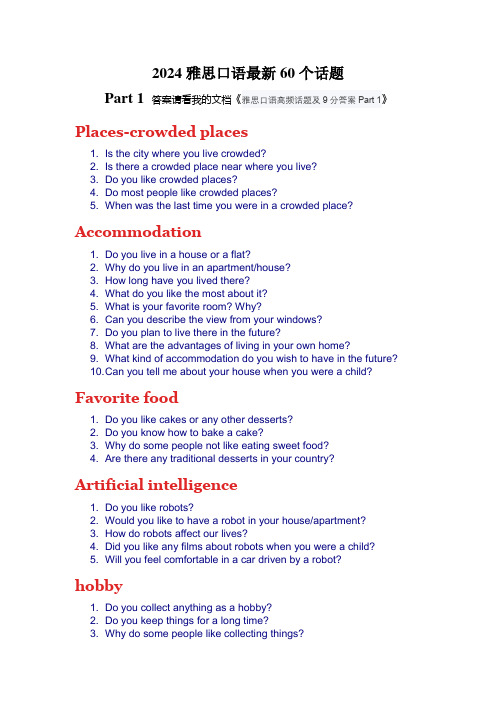
2024雅思口语最新60个话题Part 1 答案请看我的文档《雅思口语高频话题及9分答案Part 1》Places-crowded places1. Is the city where you live crowded?2. Is there a crowded place near where you live?3. Do you like crowded places?4. Do most people like crowded places?5. When was the last time you were in a crowded place? Accommodation1. Do you live in a house or a flat?2. Why do you live in an apartment/house?3. How long have you lived there?4. What do you like the most about it?5. What is your favorite room? Why?6. Can you describe the view from your windows?7. Do you plan to live there in the future?8. What are the advantages of living in your own home?9. What kind of accommodation do you wish to have in the future?10. C an you tell me about your house when you were a child? Favorite food1. Do you like cakes or any other desserts?2. Do you know how to bake a cake?3. Why do some people not like eating sweet food?4. Are there any traditional desserts in your country? Artificial intelligence1. Do you like robots?2. Would you like to have a robot in your house/apartment?3. How do robots affect our lives?4. Did you like any films about robots when you were a child?5. Will you feel comfortable in a car driven by a robot?hobby1. Do you collect anything as a hobby?2. Do you keep things for a long time?3. Why do some people like collecting things?4. Do boys and girls collect the same things?Memory1. What do you have to remember to do every day?2. Is it easy for you to forget to do these things?3. Are you good at memorizing things?4. How do you help yourself to remember things?5. Have you ever forgotten something important?Fish and fishing1. Is fishing popular in your country?2. Do you like eating fish?3. Have you ever been to a place with lots of fish around you?4. Have you ever seen any movies with lots of fish? hometown1. Where is your hometown?2. Do you like your hometown? Why?3. How long have you been living in your hometown?4. Do you believe it is a proper place to grow up? Why5. How could your hometown be improved?6. Has your hometown changed much since you were a child?7. Is there good public transportation in your hometown?8. Will you be moving away from your hometown?color1. What is your favorite color?2. Do you think color is important in your daily life?3. Are there any colors that have a special meaning in your culture?4. Do you usually help people around you?5. How do you help people around you?6. Do your parents teach you how to help others?7. What have you done to help the elderly?gifts1. What gifts do you want?2. Are you good at choosing gifts?3. Have you given other gifts made by you?Getting bored1. Do you often feel bored?2. When would you feel bored?3. What do you do when you feel bored?4. Do you think childhood is more boring or adulthood is more boring? Sunglasses1. Do you often wear sunglasses?2. Do you spend a lot of money on sunglasses?3. Do you give sunglasses as a gift?4. When do you wear sunglasses?Living area1. Where are you living now?2. Do people of different age groups live in your area?3. What do you like most about where you live?4. What is the neighborhood like where you live?5. Do you have any friends there?6. What can be improved in the area where you live?7. Do you know any famous people in the area where you live?8. Do you intend to stay in this area in the future?Running1. Do you like running?2. Where do you run?3. Which places do you think are perfect for running?4. Do you think running is a good way to stay healthy?Social media1. When did you start to use social media?2. Do you think you spend too much time on social media?3. What do people do on social media?Save money1. How do you save money?2. What do you think of e-payment?3. Do you often use credit cards?4. Do you think cash will still be popular in the future?5. Do you like spending money or saving money?music1. Do you know how to play a musical instrument?2. Do you think students should learn to play musical instruments atschool?3. Have you taken any classes on musical instruments in school?4. Which musical instrument do you like?5. How easy would it be to learn to play a musical instrument without ateacher?study1. What subjects are you studying?2. Why did you decide to study those subjects?3. Do you like your subject?4. Do you prefer to study in the mornings or the afternoons?5. Do you miss being a student?6. Is it exciting?7. Are you looking forward to working?8. How much time do you spend on your studies each week?9. Do you want to change your major?10. W hat changes would you like to see in your school?11. W hat work do you do?12. D o you like your job?13. W hy did you choose to do that type of work (or that job)?14. W hat technology do you use at work?15. W ho helps you the most? And How?16. D o you want to change to another job?2024雅思口语题库更新Part 2Describe a place where you can relax.You should say:•Where it is•What it is like•How often you go there•And explain how you feel about this place.Describe an unusual holiday/vacation you had.You should say:•When and where you went•Who you went with•What you did there•And explain why it was unusual.Describe a foreigner who can speak your language well.You should say:•who he/she is•where he/she is from•why he/she can speak your language well•and explain how you feel about this person.Describe an interesting conversation you had with an old person.You should say:•Who this person is•When and where you had the conversation•What you talked about•And explain why you think it was interesting.Describe a time when you helped someone.You should say:•Where you helped him/her•Why you helped him/her•How you helped him/her•And explain how you felt about the experience.Describe a place in your country that you think is interesting.You should say:•where it is•how you knew it•what special features it has•and explain why you are interested in it.Describe an interesting person you never met but would like to know more about him/her.You should say:•who this person is•how you knew him/her•why you think he/she is interesting•and explain how you feel about this person.Describe a job you don't want to do in the future.You should say:•What it is•Where you knew it from•Whether the job is difficult or not•And explain why you don't want to do it.Describe an outdoor activity you did in a new place recently. You should say:•What the activity is•Who invited you to participate in it•Whether you asked for help in the activity•And explain what change you had in the activity. Describe a bad service you received in a restaurant or shop. You should say:•when and where it happened•what happened•how you dealt with it•and explain how you felt about the experience. Describe a time you bought something from a street market. You should say:•When it was•Where it was•What you bought•And how you felt about it.Describe a skill that you learned when you were a teenager. You should say:•What the skill is•Who you learned it from•Why you learned it•Explain how you felt about learning itDescribe a good advertisement that you think is useful.You should say:•where you can see it•what it is about•why you think it is useful•and explain how you feel about it.Describe a uniform you wear (e.g., at school, at work).You should say:•Where you wear the uniform•How long you need to wear it•What it looks like•And explain how you feel about it.Describe a person who has interesting ideas or opinions. You should say:•who this person is•how you knew him/her•what this person does•and explain why you think his/her ideas or opinions are interesting. Describe a travel you were looking forward to but was delayed.You should say:•Where you planned to travel to•Why you were looking forward to it•Why it had to be delayed•And explain how you felt about the experienceDescribe a time when you waited a long time for a nice thing.You should say:•what you waited for•where you waited•why it was special•and explain how you felt while you were waiting.Describe a person you know who likes to talk a lot.You should say:•Who this person is•How you knew this person•What he/she usually talks about•And explain how you feel about him/her.Describe a useful object in your home that you cannot live without.You should say:•What it is•What you can do with it•How often you use it•And explain why you cannot live without it.Describe a beautiful city you have visited.You should say:•where the city is•how you knew the city•what it is famous for•and explain why it is beautiful.2024雅思口语话题汇总Part 31. Do people have enough places to relax in your country?2. What do people usually do when they are relaxed?3. Is physical activity good for relaxation?4. Do you think spending time in front of a screen helps people relax?1. Do you think people in your country have long enough holidays?2. Which holidays are popular in your country?3. What are the differences between old and young people whenspending their holidays?1. When do students in your country start to learn foreign languages?2. What qualities should a language teacher have?3. Do you have any techniques for learning languages?4. Do you think it is faster for children to learn languages than adults?5. How does technology influence language learning?1. How do people have a conversation with an elderly person?2. What can young people learn from old people?3. Do you think old people can work better than young people?4. What are the advantages of having people of different ages living inthe same house?1. Should people be very kind when they help others?2. Should children be taught to be kind to others?3. What kind of advice should parents give to their4. Can children provide any help for parents?1. How can people access travel information?2. Do people have different personalities in different regions of yourcountry?3. What causes the differences between different regions of yourcountry?4. Is an excellent tourist destination also a good place to live?1. Are there any differences in the relationship between you and yourfriends and between you and other people?2. Do people feel lonely in crowded cities?3. Can clothing tell and reveal a person's personality?4. Why do individuals from the same family have differentpersonalities?1. Do you think Al will take over many jobs?2. What would you say are the important factors to be consideredwhen choosing a career?3. Technology will make some people unemployed. How can thisproblem be solved?4. Is it common in your country for people to move to other citiesbecause of work?1. Do people go outdoors more or less now?2. What can people do outdoors besides exercising?3. When do people usually go outdoors to get close to nature?4. What can people do to get close to nature?1. How do most people respond to bad services?2. Do you think most restaurants and shops provide better servicesthan before?3. Why do some people remain silent when receiving bad service?4. What would you do as a boss to prevent bad service?1. Why do some people like to buy luxuries?2. Do you think small markets will disappear in the future?3. What are the differences between shopping in street markets andbig shopping malls?4. Do you think the goods sold at discount stores do not have goodquality?1. Where do children learn skills in your country?2. What are the differences between learning skills on your own andfrom others?3. What important skills should a child learn?4. What skills do you think teenagers should have?1. How do you feel about online advertising?2. Are there any great online advertisements?3. Why does buying new things make people happy?4. Do people still watch useless advertisements nowadays?1. Why should students wear uniforms?2. On what occasion should people wear uniforms?3. What are the advantages and disadvantages of wearing a uniform?4. Should companies ask for employees' opinions about the design ofuniforms?1. How do inventors and philosophers come up with new ideas?2. Do you think children should have their own opinions?3. Why do children often have opinions similar to their parents?4. Do you think teachers influence students' opinions?1. How do people usually go traveling?2. In what ways can traffic conditions in a city be improved?3. Do people still drive a car if public transportation is free of charge?4. How can transportation in rural areas be developed?1. On what occasions do people have to wait for a long time?2. What do people usually do while waiting?3. Why do most children have difficulties waiting for a long time?4. Do people queue consciously while waiting for the subway train? 1. How should parents encourage their children to express themselveswhen being asked questions that they are afraid to answer?2. Why do some children talk more than their peers?3. What kind of professions involve talking to groups of people?1. What equipment do you find difficult to use?2. Why do some people in the workplace dislike technology?3. Why do people buy a lot of household appliances?4. What do people often do with electronic devices?1. What are the differences between modern towns and modern cities?2. Why do some people like to visit historical sites?3. Does historic preservation contradict economic development?4. Who should be responsible for protecting historical buildings?。
雅思剑桥5口语解析test4
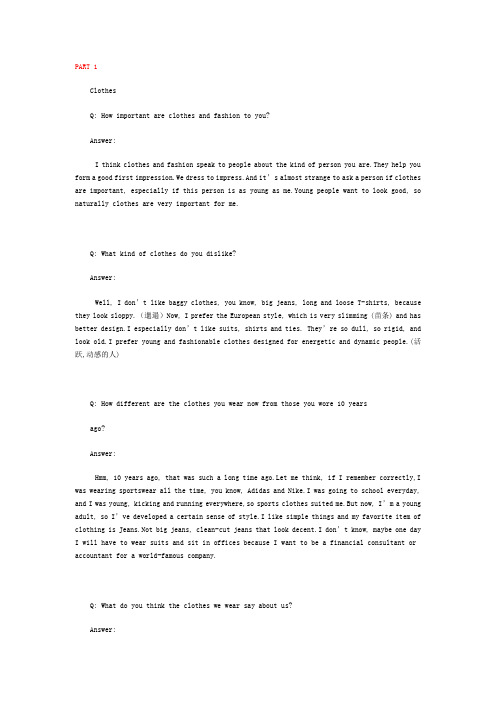
PART 1ClothesQ: How important are clothes and fashion to you?Answer:I think clothes and fashion speak to people about the kind of person you are.They help you form a good first impression.We dress to impress.And it’s almost strange to ask a person if clothes are important, especially if thisperson is as young as me.Young people want to look good, so naturally clothes are very important for me.Q: What kind of clothes do you dislike?Answer:Well, I don’t like baggy clothes, you know, big jeans, long and loose T-shirts, becausethey look sloppy.(邋遢)Now, I prefer the European style, which is very slimming (苗条) and has betterdesign.I especially don’t like suits, shirts and ties.They’re so dull, so rigid, and look old.I prefer young and fashionable clothes designed for energetic and dynamic people.(活跃,动感的人)Q: How different are the clothes you wear now from those you wore 10 yearsago?Answer:Hmm, 10 years ago, that was such a long time ago.Let me think, if I remember correctly,I was wearing sportswear all the time, you know, Adidas and Nike.I was going to school everyday, and I was young, kicking and running everywhere,so sports clothes suited me.But now, I’m a young adult, so I’ve developed a certain sense of style.I like simple things and my favorite item of clothing is Jeans.Not big jeans, clean-cut jeans that look decent.I don’t know, maybe one day I will have to wear suits and sit in offices because Iwant to be a financial consultant or accountant for a world-famous company.Q: What do you think the clothes we wear say about us?Answer:I’m pretty sure that the clothes we wear say much about our personality.For example, if you’re very out-going and passionate, or if you’re very reserved andshy. Our style of clothing also tells people about how confident we’re aboutourselves.There’s a saying, you’re what you wear. The clothes we wear can show the education and life experience we have gained. If you have ever spent time in a different country,your style of clothing maybe very different from others in your country.PART 2Describe a festival that is important in your countryYou should say:When the festival occursWhat you did during itWhat you like or dislike about itAnd explain why this festival is importantAnswers:An Important HolidayThe biggest festival of all in my country is Chinese New Year, the Spring Festival.We Chinese have celebrated it for thousands of years already. It comes betweenJanuary and February every year, but the exact date is different year to year since we use lunar calendar. Anyway, when it finally arrives, people all over the country take 7 days off. On the eve of the Spring festival, a big family reunion is held at the dinner table. We talk, we propose toast to each other, and we bond with members of our family. I don’t know when it started, but it seems to many Chinese that watchingSpring Festival Variety Show on China Central Television has become an ceremonial thing to do every year at Spring Festival.The show starts at 8 sharp and last past midnight. And as the midnight count-down is completed, we exchange new year greetings and young kids receive new year allowance. Many people will go outside and fire up firecrackers and fireworks. The whole sky is lighted upwith magnificent colors. For the midnight dinner, we eat dumplings and fish. And this is important, fish is a dish we must have, because in Chinese “fish” has the same sound as something left, something more, something extra. So by eating fish, we’re hoping that every year, we’ll make our life better. The reason I like it so much is because in a way, Spring Festival provides an opportunity for us Chinese to remember our cultural origin, a chance to relax and restore our inner balance between work and leisure, and a great time of fun at the end and beginning of a year. (278 words)PART 3:话题1:Purpose of festivals and celebrationsQ: Why do you think festivals are important events in the working year?Answer:Yeah. It’s very important for two reasons.For the country, it’s a time to remember our cultural origin and our historical past.The whole country celebrates our root and it’s very inspiring.We become so proud of our past.I guess that’s why festivals are important.For the individual, festivals give us a chance for relaxation as we often have a fewdays off. It’s a time of fun, meeting friends, entertainment.So after that we feel like a new man.In a sense, holidays restore our balance between work and leisure.That’s also why we need festivals for China.Q: Would you agree that the original significance of festival is often lost today?Answer:I think the original significance for festivals are to celebrate our tradition.It’s an end to the old year and the beginning of a new year. So it’s a connecting day.But today, people are so busy, they’re under so much pressure and they no longer feelthe transition between the old and the new year. Some companies even ask theiremployees to come in on holidays. So many people begin to feel that festivals are justas common as the other days.People no longer take the opportunities of festivals to honor their tradition,but go shopping, go to restaurant to entertain instead.So I think tradition is out, consumption is in.Festivals provide people such an excuse to put down their work, to spend money andbe extravagant (奢侈的), and to meet people that they don’t have time for during theworking year.So in this sense, even the original significance is lost, festivals are still exciting.(163 words)Q: Do you think that new festivals will be introduced in the future? What kind?Answer:The world is changing so fast.People are embracing new lifestyles as East and West come together.Westerners begin to eat dumplings with chopsticks to celebrate Chinese SpringFestival. And Chinese young people exchange chocolates and roses on Valentine’sday. So, you see? People are experimenting with new lifepatterns.And it’s quite possible that new festivals may be invented or introduced.Wouldn’t that be cool?What kind? Well, I don’t know for sure because it’s the future right?But I heard this year, in my country, some people celebrated the men’s day, which is on August the third.It’s dorky. (书呆子) But it’s new and exciting, right.Will it last?I don’t know.All I know is that this is an interesting attempt. (128 wds)话题2:Festivals and mediaQ: What role does the media play in festivals, do you think?Answer:I guess media, radio, TV station and maybe, the Internet are doing much publicity(宣传) during the festivals. So they can create an intense atmosphere of “Hey,everybody, festivals are here. Start celebrating!” And what’s more, they put on lots ofentertainment shows on different channels to help people kill time in their freer life.So I guess, these are the functions of media around holiday season. (70 words)Q: Do you think it’s good or bad to watch festivals on TV?Answer:I guess it’s good in one aspect that you can see how others are celebrating it withouthaving to travel.But watching others have fun is not as cool as going out and having fun yourself.Take you family, go on a vacation. If you’re from the north, spend New Year in thewarm south. Some of the fondest memories will be created.Breathe the fresh air is better than watch TV in a closed room.So participating in the festivals is more exciting than watching it on TV. (89 words)Q: How may globalization affect different festivals around the world?Answer:I think, on the one hand, globalization is generalizing(统一化) festivals around then world. So when you go to China, Christmas, you go to Italy, Christmas, you go to US,hey, guess what, Christmas. Everywhere is the same. That’s a bit dull, isn’t it?Because we still need variety and diversity in cultural tradition and celebration. So Iguess this is a negative effect of globalization.But, on the other hand, since globalization helps with the sharing of culture. Goodfestivals are brought to all corners of the world and the fun can be shared across thehuman race. Everybody is happy, right. So this is a positive influence.。
剑桥英语口语试题及答案
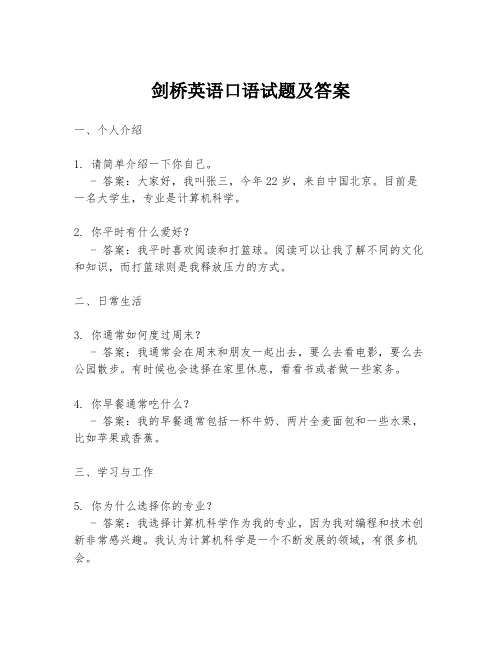
剑桥英语口语试题及答案一、个人介绍1. 请简单介绍一下你自己。
- 答案:大家好,我叫张三,今年22岁,来自中国北京。
目前是一名大学生,专业是计算机科学。
2. 你平时有什么爱好?- 答案:我平时喜欢阅读和打篮球。
阅读可以让我了解不同的文化和知识,而打篮球则是我释放压力的方式。
二、日常生活3. 你通常如何度过周末?- 答案:我通常会在周末和朋友一起出去,要么去看电影,要么去公园散步。
有时候也会选择在家里休息,看看书或者做一些家务。
4. 你早餐通常吃什么?- 答案:我的早餐通常包括一杯牛奶、两片全麦面包和一些水果,比如苹果或香蕉。
三、学习与工作5. 你为什么选择你的专业?- 答案:我选择计算机科学作为我的专业,因为我对编程和技术创新非常感兴趣。
我认为计算机科学是一个不断发展的领域,有很多机会。
6. 你在学习过程中遇到了哪些挑战?- 答案:在学习过程中,我遇到的最大挑战是理解复杂的算法和编程语言。
为了克服这些挑战,我经常和同学讨论,并向老师寻求帮助。
四、旅行与文化7. 你曾经去过哪个国家旅行?- 答案:我去过日本旅行。
那里的文化和风景给我留下了深刻的印象。
我特别喜欢日本的樱花和古老的寺庙。
8. 你最喜欢哪个节日,为什么?- 答案:我最喜欢春节。
因为这是家人团聚的时候,我们可以一起吃年夜饭,放烟花,享受节日的氛围。
五、未来规划9. 你对未来有什么计划?- 答案:我计划在毕业后找一份与计算机科学相关的工作。
长远来看,我希望能够创立自己的科技公司,为社会做出贡献。
10. 你如何看待终身学习?- 答案:我认为终身学习非常重要。
在快速变化的世界中,不断学习新的知识和技能可以帮助我们保持竞争力,并适应新的挑战。
六、观点与看法11. 你认为环境保护重要吗?为什么?- 答案:我认为环境保护非常重要。
我们只有一个地球,保护环境不仅是为了我们自己,也是为了我们的后代。
12. 你如何看待社交媒体的影响?- 答案:社交媒体在现代社会中扮演着重要的角色,它让我们能够快速获取信息和与他人交流。
剑桥雅思15test1口语
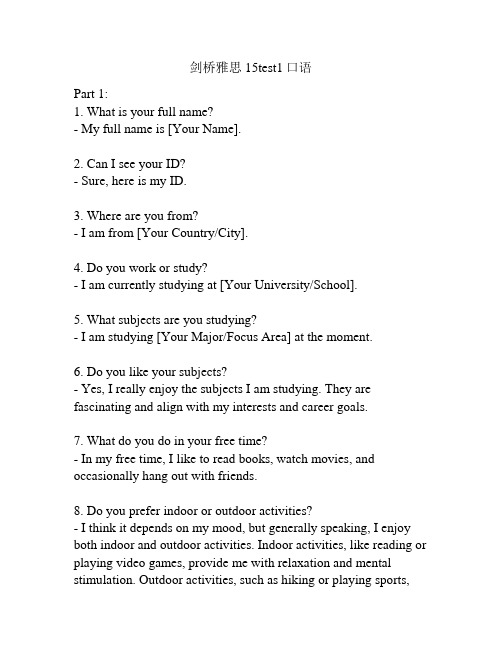
剑桥雅思15test1口语Part 1:1. What is your full name?- My full name is [Your Name].2. Can I see your ID?- Sure, here is my ID.3. Where are you from?- I am from [Your Country/City].4. Do you work or study?- I am currently studying at [Your University/School].5. What subjects are you studying?- I am studying [Your Major/Focus Area] at the moment.6. Do you like your subjects?- Yes, I really enjoy the subjects I am studying. They are fascinating and align with my interests and career goals.7. What do you do in your free time?- In my free time, I like to read books, watch movies, and occasionally hang out with friends.8. Do you prefer indoor or outdoor activities?- I think it depends on my mood, but generally speaking, I enjoy both indoor and outdoor activities. Indoor activities, like reading or playing video games, provide me with relaxation and mental stimulation. Outdoor activities, such as hiking or playing sports,help me stay physically active and explore nature.9. Have you ever participated in any sports events?- Yes, I have participated in several sports events, both during my school years and in my community. I enjoy the thrill of competition and the sense of achievement that comes from pushing myself beyond my limits.10. What kind of weather do you like?- I prefer moderate weather, neither too hot nor too cold. I enjoy spring and autumn because the temperatures are comfortable and there is often a pleasant breeze. I find it easier to engage in outdoor activities during these seasons.Part 2:Describe a beautiful city you have visited.You should say:- Where the city is located- When you visited this city- What natural and man-made beauties it has- Why you found it beautiful- I would like to talk about a beautiful city that I visited a few years ago, which is Prague, the capital city of the Czech Republic. Prague is located in Central Europe and is famous for its stunning architecture and rich history.- I had the opportunity to visit Prague during the summer vacation of my university. The weather was pleasant, with clear skies and warm temperatures, which made exploring the city even moreenjoyable.- Prague is known for its architectural gems, especially its well-preserved historic buildings. The Old Town Square, for example, is a major attraction lined with colorful baroque buildings and the famous Astronomical Clock. The Prague Castle is another must-see, featuring a mix of Gothic, Renaissance, and Baroque styles. Moreover, the Charles Bridge, adorned with statues and offering a breathtaking view of the Vltava River, adds to the city's charm.- What makes Prague truly beautiful is the combination of natural and man-made elements. The city is situated along the Vltava River, which enhances its picturesque appeal. The riverbanks are dotted with parks and gardens, providing peaceful spots for relaxation and strolls. In addition, the city's cobblestone streets, narrow alleyways, and vibrant marketplaces create a unique atmosphere that transports visitors back in time.- Personally, I found Prague beautiful because of its blend of historical grandeur and natural beauty. The architectural marvels, such as the Prague Castle and the Old Town Square, were awe-inspiring. The city's ability to preserve its cultural heritage while embracing modernity impressed me. Moreover, the charming scenery created by the river, parks, and bridges made Prague a true visual delight.Part 3:1. How can a city attract tourists?- A city can attract tourists by offering unique cultural experiences, showcasing historical attractions, promoting natural beauty,supporting local arts and cuisine, and providing convenient transportation and accommodation options. Additionally, organizing events and festivals can also play a significant role in attracting tourists.2. Do you think tourism has any negative impacts on cities?- Yes, tourism can have negative impacts on cities. For instance, it can lead to overcrowding, excessive noise, increased pollution, and the overexploitation of natural resources. Additionally, the influx of tourists can sometimes disrupt local communities and negatively impact their way of life.3. Is it important for a city to have parks or open spaces?- Yes, it is important for a city to have parks or open spaces. Parks provide a space for recreation, relaxation, and social interaction. They contribute to the well-being of residents by offering a green escape from the urban environment and promoting physical activity.4. How can cities balance their historical heritage with modern development?- Cities can balance their historical heritage with modern development by implementing strict preservation policies to protect historical sites and architecture. Simultaneously, they can encourage innovative urban planning that integrates modern infrastructure while respecting the historical context. Involving the local community in decision-making processes and promoting sustainable development practices also contribute to this balance.5. Do you think cities should prioritize environmentalsustainability?- Absolutely, cities should prioritize environmental sustainability. As urban areas continue to grow, environmental issues such as pollution and resource depletion become more significant. Emphasizing sustainable practices in transportation, waste management, energy consumption, and green spaces helps cities reduce their carbon footprint and create a healthier and more livable environment for both residents and visitors.。
剑桥雅思7解析口语Test1-4

剑桥雅思7Test1口语Part1解析剑桥雅思7Test1口语Part1解析PART 1The examiner asks the candidate about him/ herself,his/ her home,work or studies and other familiar topics.剑桥雅思7Test1口语Part1解析范例Keeping in contact with people1. Q:How do you usually contact your friends? Why?A:Most of time,I contact my friends by making phone calls to them,and to me it is the best way for communication. I prefer to listen to their voice and tell them something that has happened。
I also send short messages to them because maybe they are in the middle of a meeting or a class.2. Q: Do you prefer to contact different people in different ways? Why?A: Yes,I think so. If my friends are in another city,I prefer to chat with them online, as it saves money。
When I want to communicate with my parents, I will call them as they don’t chat on the internet. Sometimes I write to some of my friends because we want to be special.3. Q:Do you find it easy to keep in contact with friends and family? Why/Why not?A: I guess I have no problems keeping in touch with them especially when we conduct the daily conversation。
剑桥雅思口语话题核心词汇
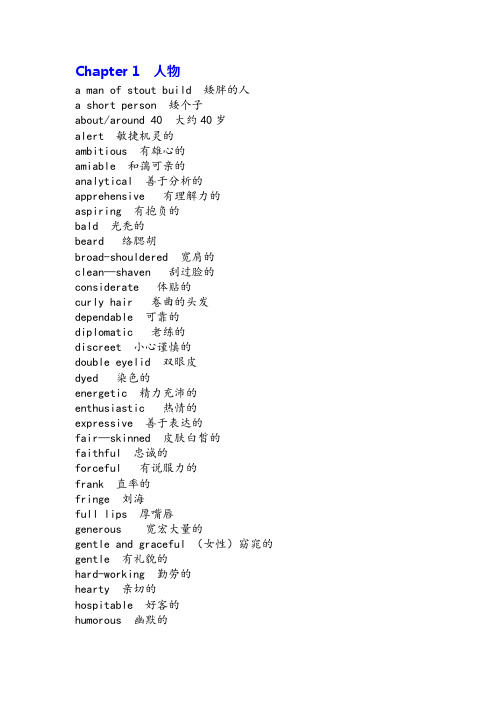
Chapter 1 人物a man of stout build 矮胖的人a short person 矮个子about/around 40 大约40岁alert 敏捷机灵的ambitious 有雄心的amiable 和蔼可亲的analytical 善于分析的apprehensive 有理解力的aspiring 有抱负的bald 光秃的beard 络腮胡broad-shouldered 宽肩的clean—shaven 刮过脸的considerate 体贴的curly hair 卷曲的头发dependable 可靠的diplomatic 老练的discreet 小心谨慎的double eyelid 双眼皮dyed 染色的energetic 精力充沛的enthusiastic 热情的expressive 善于表达的fair—skinned 皮肤白皙的faithful 忠诚的forceful 有说服力的frank 直率的fringe 刘海full lips 厚嘴唇generous 宽宏大量的gentle and graceful (女性)窈窕的gentle 有礼貌的hard-working 勤劳的hearty 亲切的hospitable 好客的humorous 幽默的in his/her 30's 30多岁independent 有主见的industrious 勤奋的long eye lashes 长睫毛long nose 长鼻梁medium build 中等身材medium height 中等身高moustache 唇上的胡子neat 整洁的oval face 瓜子脸overweight 偏胖的plait 编的辫子plump 丰满的plump/chubby cheeks 胖胖的脸蛋pointed chin 尖下巴pony—tail 马尾辫round face 圆脸slight of figure 身材瘦小的slim 苗条的square face 方脸thin lips 薄嘴唇wavy hair 波浪形头发well made—up 化妆的well-built (男性)健壮的well-educated 受过良好教育的with wrinkles/lines 有皱纹的Chapter 2 交通airport 机场arrival time 到达时间be stuck in the traffic jam 塞车bicycle 自行车boarding pass/card 登机牌/卡bus pass 公交一卡通bus 公共汽车coach 长途客车compact 小轿车compartment 车厢corridor 走廊dead(right ) on time 准点delay 晚点departure lounge (出发)休息室departure time 出发时间drink-driving /drunk-driving 酒后开车driver 司机economy class 经济舱elevator 电梯entrance 入口exit 出口E-ticket(electronic ticket )电子票fatigue driving 疲劳驾驶first class 头等舱flight attendant 空姐flight crew 机组人员flight number 航班号flight 班机jeep 吉普车left luggage office 行李寄存处light railway/rail 轻轨lobby 大厅means of transport 交通工具motor vehicle 机动车辆motorbike 摩托车motoring offence 违章驾驶mountain bike 山地车off—road vehicle 越野车on time 正点overpass 天桥passenger 乘客pedestrian 行人platform ticket 站台票rack 行李架reservation 预定return ticket 往返票rider 骑自行车/马等的人rush hour 上下班高峰期saloon/car 轿车security camera 监控摄像头security checks 安检sidewalk/pavement 人行道single/one-way ticket 单程票sleeper 卧铺spaceship 宇宙飞船staircase 楼梯ticket inspector 检票员traffic condition 交通状况traffic jam/congestion 交通堵塞traffic/road/car accident 交通事故train attendant 列车员tunnel 隧道underground/subway 地铁underpass 地下通道vehicle type 车辆类型Chapter 3 婚姻家庭arrogant 傲慢自大的be addicted in 沉迷于be tired of learning 厌学的birthday cake 生日蛋糕blow the candles 吹蜡烛bouquet 花束bread-winners 养家糊口的人bride 新娘bridegroom/groom 新郎bridesmaid 伴娘bring up/foster 抚养communicate 沟通corporal punishment 体罚democratic 民主的DINK(double income no kid ) family 不要子女的家庭discriminate 歧视divorce 离婚etiquette 礼节exchange 交换family party 家庭聚会feminist 女权主义者formality 礼节,仪式foster one’soriginality 培养创造力get—together 联欢会groomsman 伴郎guidance of parents 父母的引导harmonious 和睦的honeymoon 蜜月household chores 家务劳动independence 独立性indifferent 冷漠的innocent 天真的late marriage 晚婚marital relationships 婚姻关系naughty 调皮的negative role model 负面榜样officiator 主婚人optimistic 乐观的overlook/neglect 忽视pastor 牧师potential 潜能single-parent family 单亲家庭solitary 孤僻的Speeches 结婚祝词spoil 溺爱stimulate interest 激发兴趣support a family 支撑家庭trustworthy 可信赖的Vows 婚誓wedding anniversary 结婚纪念日wedding cake 婚礼蛋糕wedding ceremony 结婚典礼wedding dress 婚纱wedding ring 结婚戒指widen one's outlook 开阔眼界Chapter 4 喜好active 积极活跃的backstroke 仰泳billiards 台球breaststroke 蛙泳cycle racing 骑自行车运动develop social skills 培养交际能力energetic 精力充沛的enjoyable 令人愉快的flying kites 放风筝go fishing 垂钓go for a drive in one’s car 驾车兜风go on an outing 去远足gymnasium 体育馆,健身房hang about in a bar 泡吧have some time at one's own disposal 有独立支配的时间interactive 互动的keep fit 保持健康leisure activity 休闲活动optimistic 乐观的outdoor exercise 室外活动parachuting 跳伞pastime 消遣,娱乐play bowling 打保龄球play cards 打牌play chess 下棋play golf 打高尔夫球refresh 使精神振作sing songs in KTV 在KTV唱歌sleep in/lie in 睡懒觉soap opera 肥皂剧soothe/ease fatigue 缓解疲劳soothe field 运动场stadium 露天运动场stay motivated 保持活力stimulate the mind 刺激思维stimulating 刺激的strike a proper balance between work and leisure 劳逸结合stroll up/down the streets 逛街surf the web/Internet 上网冲浪surfing 冲浪to relieve the stress/tension 减压to strengthen muscles 锻炼肌肉track-and—field 田径运动TV serials 电视连续剧vigorous 精力旺盛的visit/stroll around a park 逛公园visual stimulation 视觉刺激Chapter 5 建筑accommodation 住宅altar 坛arch 拱形门architecture 建筑be located in the middle of CBD 位于中心商业区的中央be located in 坐落在/地处于……building with a classical trend 古典风格建筑building 建筑业,建筑物bungalow 平房cathedral 大教堂CBD(Central Business District) Chinese—styled 中式风格的church 教堂city square 城市广场classic masterpiece 经典的杰作contemporary style 现代风格European style 欧式风格European-styled 欧式风格的flat/apartment 公寓Forbidden City 故宫stand.。
- 1、下载文档前请自行甄别文档内容的完整性,平台不提供额外的编辑、内容补充、找答案等附加服务。
- 2、"仅部分预览"的文档,不可在线预览部分如存在完整性等问题,可反馈申请退款(可完整预览的文档不适用该条件!)。
- 3、如文档侵犯您的权益,请联系客服反馈,我们会尽快为您处理(人工客服工作时间:9:00-18:30)。
4
Test 1
I. Friends
II. Interesting historic place
Test 2
I. Food and cooking
II. Interest or hobby that you enjoy Test 3
I. Leisure
II. A river, lake or sea which you like Test 4
I. Your favorite place
II. A useful website you have visited 5
Test 1
I. Your country
II. A well-known person you like or admire Test 2
I. Color
II. A song or a piece of music
Test 3
I. Entertainment
II. One of your friends
Test 4
I. Clothes
II. A festival that is important in your country
6
Test 1
I. Dancing
II. Someone in your family who you like
Test 2
I. Musical Instruments
II. Something healthy you enjoy doing
Test 3
I. Traffic where you live
II. A game or sport you enjoy playing
Test 4
I. Your friends
II. An important choice you had to make in your life 7
Test 1
I. Keeping in contact with people
II. A party you enjoyed
Test 2
I. Laughing
II. An idea you had for improving something at work or college
Test 3
I. Cold weather
II. A competition (e.g. TV, college/ work or sports competition) that you took part in
Test 4
I. Traveling to work or college
II. A piece of electronic equipment that you find useful
8
Test 1
I. Neighbors
II. A time when you were asked to give your opinion in a questionnaire or survey
Test 2
I. Newspaper and magazines
II. A restaurant you enjoyed going to
Test 3
I. Flowers
II. A meeting you remember going to at work, college or school 9
Test 1
I. Games
II. An open-air or street market which you enjoyed visiting
Test 2
I. Giving gifts
II. Something you did that was new or exciting Test 3
I. Telephoning
II. A journey (e.g. by car, plane, boat) that you remember well
Test 4
I. Television
II. A friend of your family you remember from your childhood Test 4
I. Bicycles
II. A person who has done a lot of work to help people。
